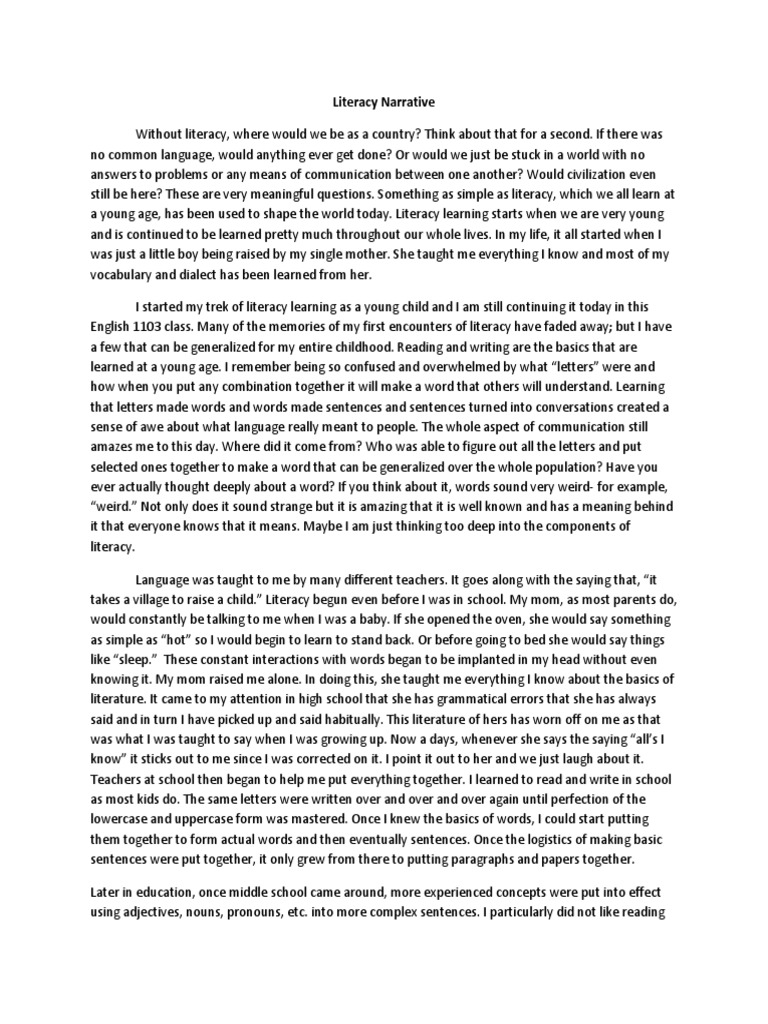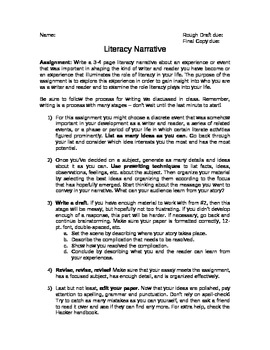
Chapter 7 - Writing a Literacy Narrative. Jami Jordan. Outline: Key Features; Well-told story; Situation that needs to be resolved; Role that reading or writing played in someone's life; Vivid detail; Mental sensations of the sights, sounds, smells, tastes, and textures; Help readers imagine places, people, and To start, a literacy narrative is a personalized story. Hook: Begin with a hook to draw the reader in. This could be your first experience with books or how reading and writing define you. Focus: Rounding out your first paragraph, you’ll want to give a short thesis that tells the reader the whole point of your story · It is easy to write in difficult words, but difficult to write in easy words. ― Anonymous. A literacy narrative is a first-hand narrative about reading, writing, teaching, and composing in any form of context. It is a form of autobiographical writing such as an essay, which can help you learn and evaluate the role of literacy in your blogger.comted Reading Time: 6 mins
Literacy Narrative Essay Example For Students - words | Artscolumbia
It is easy to write in difficult words, but difficult to write in easy words. A literacy narrative is a first-hand narrative about reading, writing a literacy narrative, writing, teaching, and composing in any form of context.
It is a form of autobiographical writing such as an essay, which can help you learn and evaluate the role of literacy in your life. It can unravel your attitudes and abilities, along with how you have developed as a reader, writer, thinker, and communicator.
It can prompt you to explore and reminisce the choices, moments, experiences, or stages of your personal development. It will also help you realize your growth in terms of writing, reading, communicating, thinking, and writing a literacy narrative listening.
It can be sad, happy, remorseful, funny, writing a literacy narrative, informative, incidental, etc. You need to remember that literacy narratives are theme-based and open-formed, and do not have a strict structure or thesis. You could write about personal challenges like overcoming difficulties, early memories of listening to a story or reading it, or simply write about your favorite book, poem, etc. These should be written in a sentence form.
This is because a literacy narrative is not just about writing about your favorite literature, it is more personal than that. It is about realizing why you liked reading the literature, what attracted you to it, etc. Do not go astray from your topic; stay focused on the theme. If you are unsure about your theme, work on it simultaneously. This method is also known as reflecting. You will need to ask the following questions time and again while and after writing your narrative. As in, is the diction, tone, and language appropriate for the purpose of my literacy narrative?
Is it too casual or too formal? Halfway back home, the car began to wobble and slow down. Dad realized that the car had a flat tire. To make things worse, we were stranded in the middle of a snowstorm. Nothing really worked in that car, but luckily, dad got his miracle! We waited there in the middle of nowhere for someone to come along and help us out.
The cold wind started blowing in through the little gap in the door frame and the window. It whistled and moaned and scared me half to death. The breeze that blew in was pricking my nose and cheeks, writing a literacy narrative. I could smell the pine tree in the air; given the fact that we had one tied to the roof, Christmas was just a few days away.
Dad and I both began search for some way to clog that thin gap to keep the cold out. As I reached into my jacket pocket, I realized there was a piece of folded writing a literacy narrative in it. I pulled it out, only to realize that it was the lyrics of the carol, Hallelujah. I was overcome with the sudden burst of the singing spell, and I began to sing it. Dad too pitched in now and then. By the time I sang Hallelujah after the second verse, the cold winds had stopped.
And writing a literacy narrative do you know, it was my Uncle Mitch coming our way with help! Keep your language clear, plain, and simple as this will help your message to be understood easily. Skip to primary navigation Skip to main content Skip to primary sidebar Skip to footer How to Write a Literacy Narrative — Explained With Examples A literacy narrative is a form of free writing that brings life experiences into account.
Next Post ». Share Tweet Pin LinkedIn Email. Get Updates Right to Your Inbox Sign up to receive the latest and greatest articles from our site automatically each week give or take right to your inbox. May 10, This website uses cookies to improve your experience. We'll assume you're ok with this, but you can opt-out if you wish.
Cookie settings Accept. Close Privacy Overview This website uses cookies to improve your experience while you navigate through the website. Out of these cookies, the cookies that are categorized as necessary are stored on your browser as they are essential for the working of basic functionalities of the website. We also use third-party writing a literacy narrative that help us writing a literacy narrative and understand how you use this website.
These cookies will be stored in your browser only with your consent. You also have the option to opt-out of these cookies. But opting out of some of these cookies may have an effect on your browsing experience. Necessary Necessary. Necessary cookies are absolutely essential for the website to function properly.
This category only includes cookies that ensures basic functionalities and security features of the website. These cookies do not store any personal information. Non-necessary Non-necessary. Any cookies that may not be particularly necessary for the website to function and is used specifically to collect user personal data via analytics, ads, writing a literacy narrative, other embedded contents are termed as non-necessary cookies.
It is mandatory to procure user consent prior to running these cookies on your website.
Literacy Narrative Outline Example
, time: 7:03Literacy Narrative Essay example - Words | Bartleby

Chapter 7 - Writing a Literacy Narrative. Jami Jordan. Outline: Key Features; Well-told story; Situation that needs to be resolved; Role that reading or writing played in someone's life; Vivid detail; Mental sensations of the sights, sounds, smells, tastes, and textures; Help readers imagine places, people, and To start, a literacy narrative is a personalized story. Hook: Begin with a hook to draw the reader in. This could be your first experience with books or how reading and writing define you. Focus: Rounding out your first paragraph, you’ll want to give a short thesis that tells the reader the whole point of your story The literacy narratives were not only a means to base where my writing skills are at, but take in information about people I barely know. Amongst my group, I would have to say the two foreign students had my attention indefinitely the entire time, because I was intrigued to
No comments:
Post a Comment